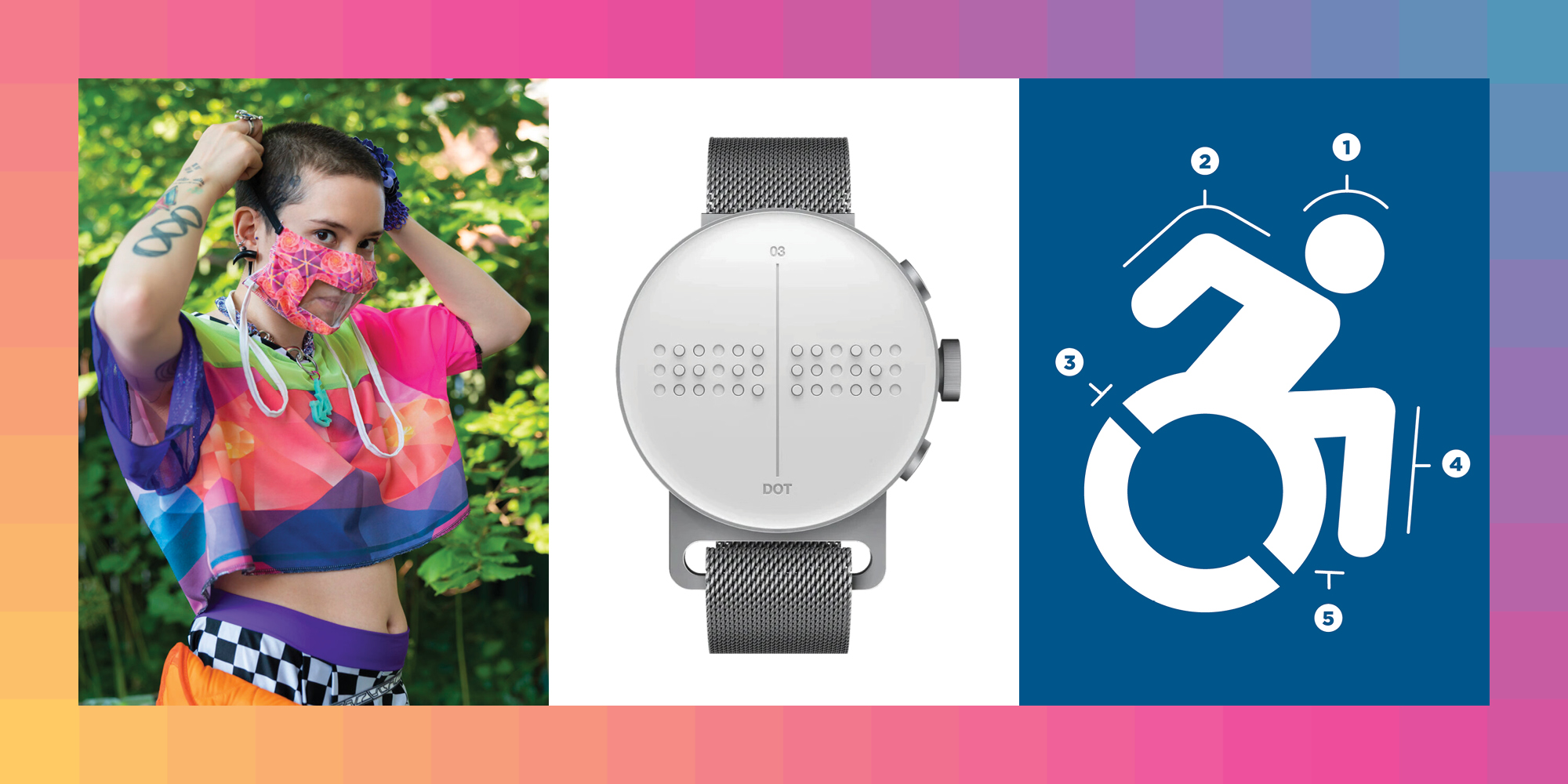Centering Disability in Design: A Conversation
What does it look like when disabled people are viewed not as edge cases or afterthoughts in the design process, but as the default users? What happens when, instead of flattening disability into an indistinguishable group of “all abilities,” we understand and design for the unique and varied experiences of disabled people? How can we prioritize, honor, and celebrate disability in our design practice? Join our panelists in conversation to answer these questions about designing FOR and WITH disability.
Panelists
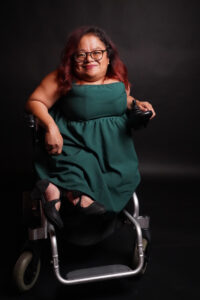 Olivia Mae M. Asuncion, AIA (she/her), has oriented her career path towards building inclusive communities as an architect and design researcher from Oakland, California. She started off with helping Bay Area non-profit organizations through construction, project, and property management, including the Ed Roberts Campus, a universally designed building in Berkeley that houses several disability-centered organizations. She then transitioned into the design and construction of public safety buildings, public sector offices, and community spaces, and K-12 educational facilities, with a focus on going beyond the building code minimums and finding creative solutions to enhancing accessibility in the built environment. Asuncion’s notable research projects include: a study assessing the efficacy and accessibility of existing evacuation protocols and building safety codes; collaboration with university faculty on the post-occupancy evaluation of the Ed Roberts Campus; and a Fulbright Program project studying the accessibility of elementary schools in the Philippines. She is currently serving as a public member of the U.S. Access Board.
Olivia Mae M. Asuncion, AIA (she/her), has oriented her career path towards building inclusive communities as an architect and design researcher from Oakland, California. She started off with helping Bay Area non-profit organizations through construction, project, and property management, including the Ed Roberts Campus, a universally designed building in Berkeley that houses several disability-centered organizations. She then transitioned into the design and construction of public safety buildings, public sector offices, and community spaces, and K-12 educational facilities, with a focus on going beyond the building code minimums and finding creative solutions to enhancing accessibility in the built environment. Asuncion’s notable research projects include: a study assessing the efficacy and accessibility of existing evacuation protocols and building safety codes; collaboration with university faculty on the post-occupancy evaluation of the Ed Roberts Campus; and a Fulbright Program project studying the accessibility of elementary schools in the Philippines. She is currently serving as a public member of the U.S. Access Board.
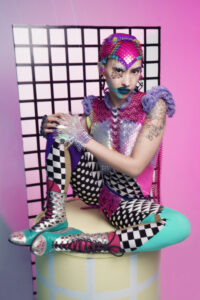 Sky Cubacub (They/Them/Xey/Xem/Xyr) is a non-binary xenogender disabled Filipinx neuroqueer from Chicago, Illinois. They are the creator of Rebirth Garments, a line of wearables for trans, queer, and disabled people of all sizes and ages, which started in summer 2014. Sky is the editor of the Radical Visibility Zine, a full color cut and paste style zine that celebrates disabled queer life, with an emphasis on joy. Additionally xey are the Access Brat and the editor of a section on ethics and inclusion called “Cancel & Gretel” at literary fashion magazine “Just Femme and Dandy.” Sky has most recently been working on a free online queercrip DIY fashion program with Chicago Public Library called Radical Fit. Sky was named 2018 Chicagoan of the Year by the Chicago Tribune and is a 2019/2020 Kennedy Center Citizen Artist and a Disability Futures Fellow.
Sky Cubacub (They/Them/Xey/Xem/Xyr) is a non-binary xenogender disabled Filipinx neuroqueer from Chicago, Illinois. They are the creator of Rebirth Garments, a line of wearables for trans, queer, and disabled people of all sizes and ages, which started in summer 2014. Sky is the editor of the Radical Visibility Zine, a full color cut and paste style zine that celebrates disabled queer life, with an emphasis on joy. Additionally xey are the Access Brat and the editor of a section on ethics and inclusion called “Cancel & Gretel” at literary fashion magazine “Just Femme and Dandy.” Sky has most recently been working on a free online queercrip DIY fashion program with Chicago Public Library called Radical Fit. Sky was named 2018 Chicagoan of the Year by the Chicago Tribune and is a 2019/2020 Kennedy Center Citizen Artist and a Disability Futures Fellow.
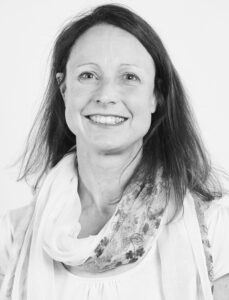 Christine Hemphill (she/her) is a disability and age-inclusive researcher, designer, and innovator. In 2015 she founded and continues to lead Open Inclusion, a London-based, global insight, design, and innovation agency. Hemphill is a Certified Member of the Market Research Society (MRS), a Certified Professional in Accessibility (CPACC) with the IAAP and currently chairs MRS Unlimited, the disability-inclusive research sector group in the UK. She is an Ambassador for Co-Innovate at Brunel University and a past leader and ongoing active member of the Inclusive Design for XR group at XRAccess. As a neurodivergent individual and parent, wife, aunt, and daughter of family members who have different access needs and disabilities, understanding and designing for human differences is a personal and professional joy.
Christine Hemphill (she/her) is a disability and age-inclusive researcher, designer, and innovator. In 2015 she founded and continues to lead Open Inclusion, a London-based, global insight, design, and innovation agency. Hemphill is a Certified Member of the Market Research Society (MRS), a Certified Professional in Accessibility (CPACC) with the IAAP and currently chairs MRS Unlimited, the disability-inclusive research sector group in the UK. She is an Ambassador for Co-Innovate at Brunel University and a past leader and ongoing active member of the Inclusive Design for XR group at XRAccess. As a neurodivergent individual and parent, wife, aunt, and daughter of family members who have different access needs and disabilities, understanding and designing for human differences is a personal and professional joy.
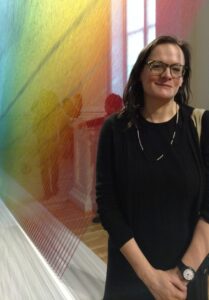 Moderated by Dr. Bess Williamson (she/her). Dr. Williamson is a historian of design and material culture and Professor of Art History, Theory, and Criticism at the School of the Art Institute of Chicago. She is the author of Accessible America: A History of Disability and Design (2019) and co-editor of Making Disability Modern: Design Histories (2020). Her work explores diverse histories and practices of design that extend expertise to users and communities, and challenge designers to address access and power in their work.
Moderated by Dr. Bess Williamson (she/her). Dr. Williamson is a historian of design and material culture and Professor of Art History, Theory, and Criticism at the School of the Art Institute of Chicago. She is the author of Accessible America: A History of Disability and Design (2019) and co-editor of Making Disability Modern: Design Histories (2020). Her work explores diverse histories and practices of design that extend expertise to users and communities, and challenge designers to address access and power in their work.
ABOUT THE PROGRAM
- Program Length: 90 minutes
- Interactivity Level: Low.
- Intended Audience: All audiences are welcome. No previous design knowledge is required.
Accessibility
- Location: This is a virtual program offered in Zoom. Registered participants will be supplied with a Zoom link.
- What to Expect: This virtual program will feature a panel discussion and audience Q&A hosted through Zoom, with the option to dial in. Details will be emailed to you upon registration. This program includes live closed captioning and ASL interpretation. It will be recorded and available on Cooper Hewitt’s YouTube channel a week following the lecture.
- Accommodations: For general questions, or if we can provide additional accessibility services or accommodations to support your participation in this program, please email us at CHEducation@si.edu or let us know when registering. Please make your accommodation request as far in advance as possible—preferably at least one week before the program date when possible.
About national Design week
National Design Week celebrates the power of design in our everyday world. Launched in 2006, National Design Week is held in conjunction with the National Design Awards. From October 2–8, Cooper Hewitt’s galleries will be free to enter, and programs will welcome all to engage with design. Join us for the presentation of the 2023 National Design Awards, and visit our calendar for a complete listing of programs during National Design Week.
Special Thanks
National Design Awards Partners

Shelby and Frederick Gans
Helen and Edward Hintz
National Design Awards Sponsors
Apple
Alexandra and Paul Herzan
Lisa Roberts and David Seltzer
Crystal and Chris Sacca
National Design Awards Patrons
Kimberly Schuessler
Richard M. Smith and Dr. Soon-Young Yoon
Jon C. Iwata
Agnes Gund
Scott Belsky
Victor Calise
Champions Design
Heller Furniture
Bobby Martin
Thomas Robinson
Margaret Stewart
Design learning at Cooper Hewitt is made possible by eBay Inc., The Hirsch Family Foundation, The Milton and Sally Avery Arts Foundation, The Pinkerton Foundation, PwC Charitable Foundation, The Richard and Jean Coyne Family Foundation, with internal Smithsonian Institution funds from the Youth Access Grants for Youth Innovation in Rural America, and public funds from New York City Department of Cultural Affairs in partnership with the City Council.

National Design Awards trophies are created by The Corning Museum of Glass.
